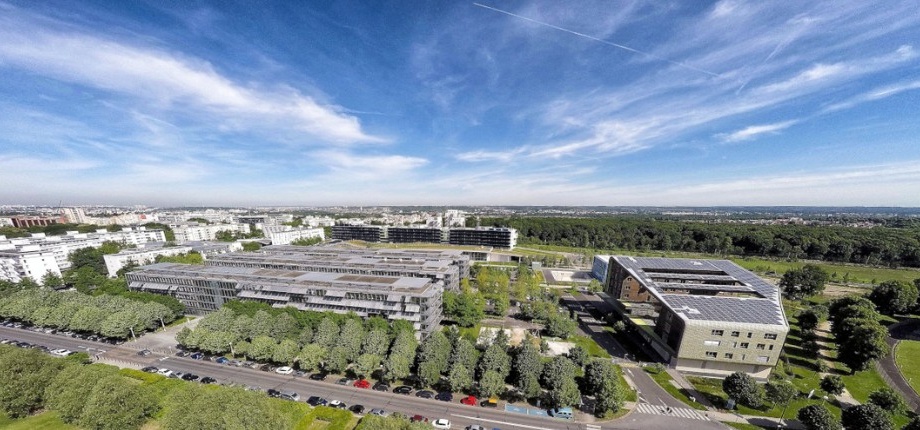Sustainable development
The socio-economic transitions of our societies are generating a multitude of challenges that require us to think globally but act locally. Through its research and teaching programs, École nationale des ponts et chaussées enables its researchers, students and graduates to help shape the dynamics of these transitions. It takes a systemic, forward-looking, multi-disciplinary and open approach to structuring them.
Assessment of France's Higher education institutions based on SD&SR criteria
École nationale des ponts et chaussées' CSR strategy is based on the 5 axes of the SD&SR (sustainable development and social responsibility) reference framework proposed by the Conférence des Grandes Écoles and the Conference of University Presidents. In October 2024, the School applied for certification based on these guidelines. In 2023, it set up an SD&RS council, which met twice and validated a master plan in October 2024. The plan is based on process mapping, which is part of the École's ISO 9001-certified quality approach.
A management system that integrates SD&RS:
- An approach linked to the quality management system
- An SD&RS Committee bringing together internal and external stakeholders to report on actions and define and steer strategy.
- A Socio-Ecological Transformation Manager reporting directly to the Director of the School, working alongside the Director of Digital Transformation and the Director of Process Transformation.
- A dialogue with student associations (Dévelop'Ponts, Forum Étudiant pour un Avenir Durable) to ensure consistency of actions.
- Process management with a view to efficiency, collaboration and sobriety
- Regular performance measurement
- A responsible purchasing policy
Create and pass on knowledge, methods, tools and modes of governance to ensure that our actions respect planetary limits and improve living conditions for everyone
Teaching
- A skills framework that fully integrates the socio-ecological transition
- A set of training objectives defined in 2020
- A common core curriculum to achieve these pedagogical objectives
- An assessment of the syllabuses of each of the engineering training modules and Masters courses in terms of their contribution to the skills identified.
- Promotion of students' commitment to sustainable development and social responsibility both inside and outside the School, particularly during visits to companies and in their associative activities.
- Supporting training players in their SD&RS transformation.
Producing knowledge
- Work to define the terms and conditions of governance to clarify the purpose of “responsible research” at the School and provide support for researchers.
- An assessment of the environmental impact of the School's research, with a view to reducing it.
Sharing and disseminating knowledge
- Helping to restore confidence in science
- Development of the Open Science plan
- Participation at national level in the deployment of the SD&RS approach in higher education
A thriving, supportive and agile team
A responsible, collaborative campus
- Safe, comfortable, functional buildings that facilitate exchanges and respect the environment
- Responsible food supply for all users
- Reducing the environmental impact of mobility
- Controlling the environmental impact of our digital uses
A transparent and fair social policy
- Implementation of a quality of life policy at School and at work
- Promoting diversity in the recruitment of students, researchers and employees
- Inclusion of SD&RS as a structuring component of the GPEC process
Efficient work tools that facilitate collaborative working
- Optimization of our information system
- Promoting sober use of resources
Monitoring the environnemental indicators of the Green Plan
Presented annually to the School Council, this report provides a summary of the key sustainable development indicators and targets.
Download École nationale des ponts et chaussées Green Plan (in French)
The Grenoble Agreement
The School signed the Grenoble Agreement in December 2021. This agreement brings together over 50 Higher Education Institutions committed to ecological transition.
Download the Grenoble Agreement
Public procurement
The 2021-2025 French National Action Plan for Sustainable Purchasing specifies that 30% of public contracts must have at least one social or environmental clause.
At École nationale des ponts et chaussées, this target has been met: out of the 25 contracts awarded in 2024, 14 included at least one social or environmental clause.
For more than ten years, École nationale des ponts et chaussées has been deploying a skills-based approach to enable everyone to define, analyze, deploy and evaluate the terms and conditions of their actions in terms of their sustainability. In 2020, a working group bringing together researchers, students and training managers defined a list of 70 training objectives to enable students to become players in the socio-ecological transition. Among the seven generic competencies of the Ponts engineer, two are particularly relevant to this logic:
Align actions with the challenges of sustainable development and the dynamics of transition
- Assessing the social utility of a good, service or project
- Carrying out a multidimensional environmental assessment of a good, service or project (life-cycle analysis)
- Designing solutions that combine economic viability, social utility, protection of human health and the environment, adaptation to climate change and non-depletion of resources.
- Defining a deployment strategy that takes into account long-term issues, path dependencies, and human (skills, mobility, etc.), technical and societal transition dynamics.
- Creating the desirability of proposed solutions by working on stories, and helping to redefine collective imaginations.
- Positioning its actions within a logic of energy sobriety and decarbonization of energy systems
- Explaining your value system and analyzing the coherence between actions and values
Understanding and managing system complexity
Understanding system complexity
- Articulating strategies with long-term issues
- Identify system limits, defining variables and constraints between them
- Assessing risks
- Acquire and cultivate critical thinking skills
- Define the problem and identify the parameters to be taken into account
- Develop a critical awareness of the wider multidisciplinary context of engineering and of knowledge issues at the interface between several fields
Managing system complexity
- Making decisions based on incomplete or limited information, taking responsibility for these decisions
- Evaluating the resistance of a strategy and readjust if necessary
- Making decisions taking into account future contingencies
Right from the first year, two courses structure this multidisciplinary approach: “Scientific foundations for the energy transition” and “Sustainable development: the challenges of a complex and uncertain world”. The scientific and technical skills developed in this core curriculum enable students to strengthen their understanding of physical phenomena and the technological responses that are essential to mastering these issues. This approach is complemented by a presentation of the economic, organizational and social challenges of the ecological and energy transitions, so that students develop a critical eye for corporate investment choices and public policies, as well as for the organizational modes capable of fostering the major transformations required. A second course enables students to position themselves as responsible engineers in a complex and uncertain world.
During their 2nd and 3rd year of training, this teaching continues to focus on tools and frameworks for structuring analysis and decision-making. It focuses on life-cycle analysis as a tool for steering design and assessment processes, and offers tools for making decisions in an uncertain environment, taking long-term consequences into account (a forward-looking approach that is particularly necessary when deploying infrastructures whose lifespan can be counted in decades), or understanding how a company's corporate social responsibility approach fits in with the challenges facing its sector.
Applications in every field
In addition to this common base, each department's curriculum offers concrete responses to the challenges of ecological and energy transition: thermal renovation, rehabilitation, eco-design, sustainable materials and structures (wood, earth, etc.), financing the transition, risk and uncertainty management, for example. By offering direct applications of the concepts taught in class or through projects dedicated to sustainable development, the courses integrate these issues in a very broad way.
In addition to courses dedicated to transition issues, socio-environmental concerns permeate the entire curriculum, adapted to the content of each course and its pedagogy. For example, final-year design projects are proposed for an existing, already urbanized site, with environmental assessments (LCA, impact on biodiversity) and questions raised about their purpose. Some courses involve assessing a company's climate risk reduction strategy, while others focus on improving mobility systems.
Training focused entirely on successful transitions
Students can pursue a course of study focused on sustainable development issues by continuing their 3rd year in the engineering cycle or in Master's courses entirely dedicated to these issues:
- 1 Master's programme on sustainable mobility: Transport and Sustainable Development.
- 2 Master's programmes on energy: Energy Transition at the Local Scale; Nuclear Energy, Decommissioning and Waste Management.
- 5 Master's programmes on Environmental Economics and Economics of Energy and Transportation and 1 Master's programme Materials Science for Sustainable Construction (SMCD)
- 1 Master's programme on the Management and Engineering of Environmental Services.
Whether students choose to work in civil engineering, mechanical design, regional planning, production systems organization, urban environmental management, transport and mobility, project financing or energy transition management, Ponts engineers will make a concrete contribution to adapting to and mitigating climate change, preserving the living world and resources, and promoting a fair and democratic transition.
Lifelong learning
Among the 14 Lifelong Learning programmes the School offers, five of the Executive Masters (Masters spécialisé®) programmes actively contribute to training transition stakeholders:
- Sustainable Real Estate and Building (IBD)
- Public Policies and Actions for Sustainable Development (PAPDD)
- Management of Energy Projects
- Smart Mobility
- Engineering of Large Energy Structures (GCGOE)
A committed and innovative school: the Pontanique garden project
The “We Are What We Eat” course run by Stacey Benoît, head of the School's English department, focuses on food issues and gives students hands-on experience “in english” in the School's organic community garden, Jardin Pontanique. This project broadens the definition of knowledge by adding a manual component, a source of creation, imagination and well-being.
This approach ticks all the boxes when it comes to biodiversity and student learning in the face of failure (plants that refuse to grow!), success and decompartmentalization between teachers and students.
On June 21st, 2022, the School was awarded a prize for this project by the Conférence des Grandes Ecoles in the “La belle idée” category, at the first Pedagogical Innovation Awards.
Energy and ecological transition issues are the central focus of research at École nationale des ponts et chaussées can draw on particularly advanced research in socio-ecological transition, both because of the orientations of its laboratories: environmental, energy and climate economics (CIRED, PjSE), urban water and air (LEESU, CEREA and HM&Co), impacts of technical systems on territories and their inhabitants (LATTS), sustainable mobility (LVMT), climate sciences (LMD), renewable energies (LHSV), risk and uncertainty management (CERMICS, Navier), sustainable materials for construction (Navier), digital twins (LIGM)... as well as strong industrial partnerships.
Of the 15 Chairs at the School, 3 are directly focused on the challenges of transition, its economy and financing, 1 on the environment, 2 on sustainable cities, 1 on energy and 4 on sustainable mobility and logistics.
École nationale des ponts et chaussées is also:
- Co-founder, with IPParis, of a new Energy For Climate (E4C) interdisciplinary centre where nearly 30 laboratories work on four cross-disciplinary themes to reduce greenhouse gas emissions, improve energy efficiency, deploy renewable energy distribution and propose effective energy policies.
- Founding member of the Renault-ParisTech Sustainable Mobility Institute, a platform for researchers from partner engineering schools and the company's employees to develop and grow research programmes to support new mobilities.
Coriolis building
A certified High Energy Performance Building, Coriolis is one of the few educational buildings in France to have achieved an exceptional level in the construction phase. It obtained the "exceptional" ranking in the NF HQE Tertiary Buildings category on 17 January 2014. The building consumes 50% less energy than the benchmark level for conventional consumption since it achieves 114% energy savings. This exceptional performance makes the building eligible to obtain the highest energy performance label issued by CertiVéa: the BEPOS label.
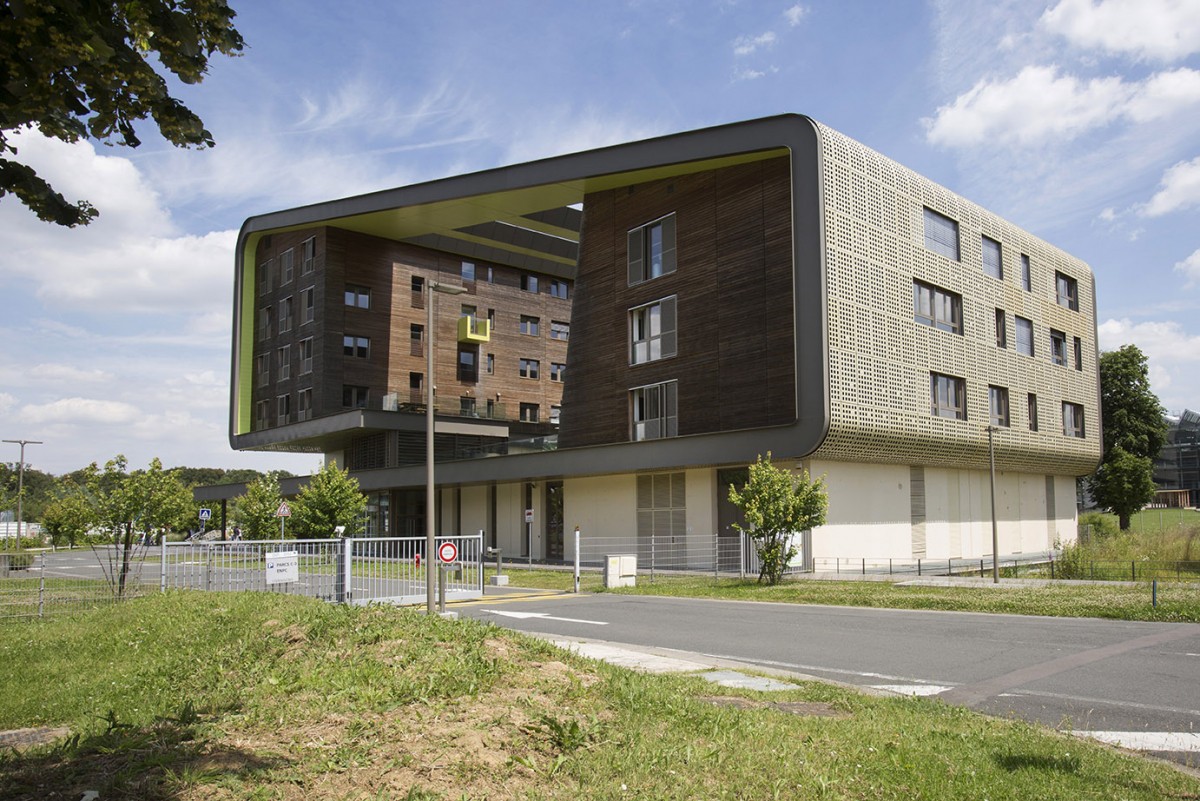
Carnot building
Since 2020, the Carnot Building has been undergoing an extensive renovation to reduce energy consumption by 10%.
- Adapted air quality: changes made to 36 air units to best adjust the ventilation of classrooms and offices depending on the number of occupants.
- More reliable heating: improvement of heating systems in order to limit energy loss and improve user comfort by ensuring a homogenous temperature in the offices. The Carnot-Cassini building will soon be connected to the Cité Descartes heating network.
- Improved lighting: replacement of light fixtures in work spaces and corridors.
This new equipment will function with presence detectors and take natural daylight into account.
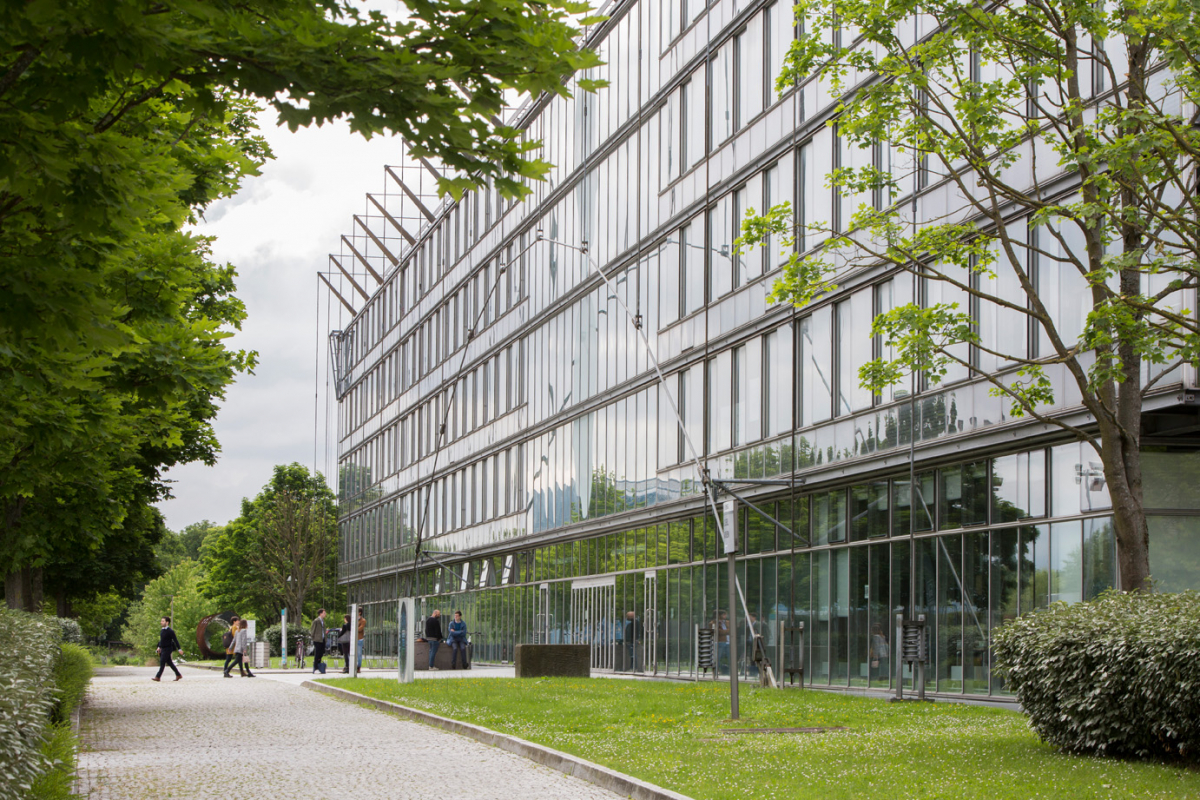
Bienvenüe building
Bienvenüe is a Low-Energy Building with thick walls due to extra insulation.
- High Environmental Performance Certification (2008 criteria) emphasising the relationship with the environment, energy management, upkeep and maintenance, comfort.
- Low-Energy Building (2005) through an overall bioclimatic design programme: orientation, architectural design, ventilation, energy management and geothermics.
- Evolution toward a positive energy building through the production of pholtovoltaic energy.
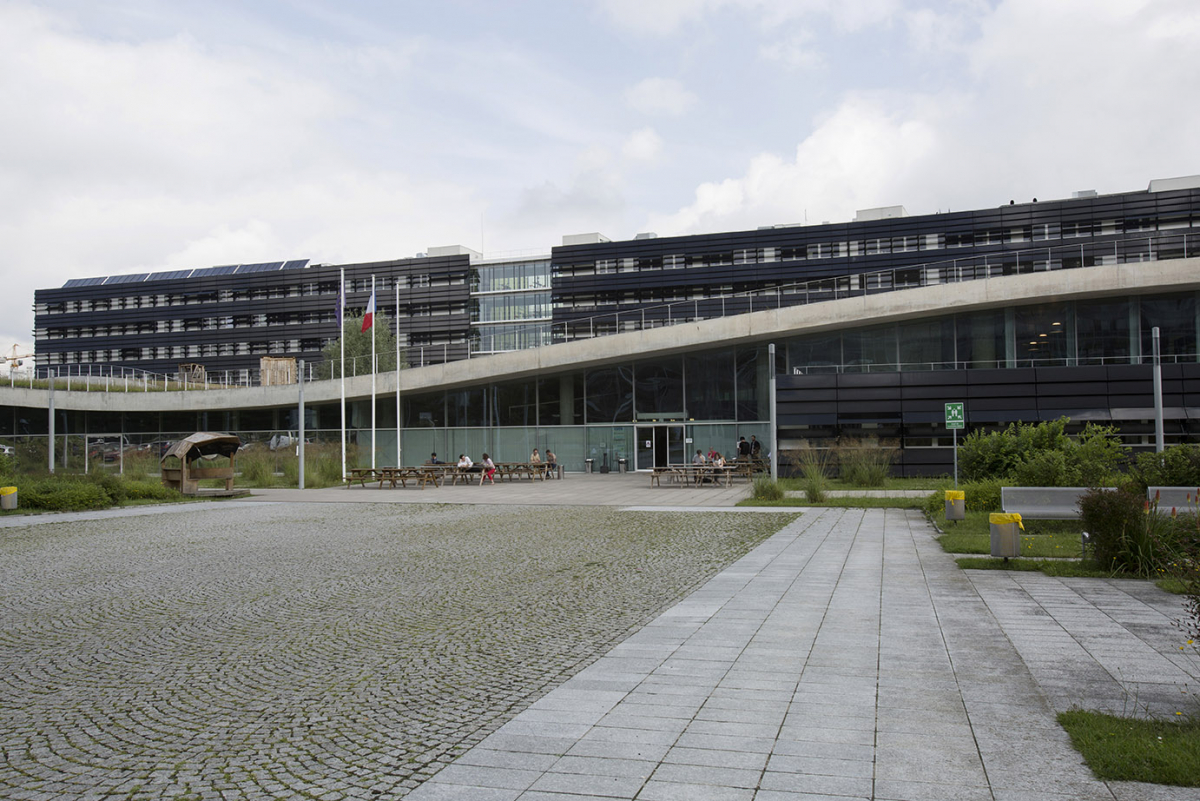
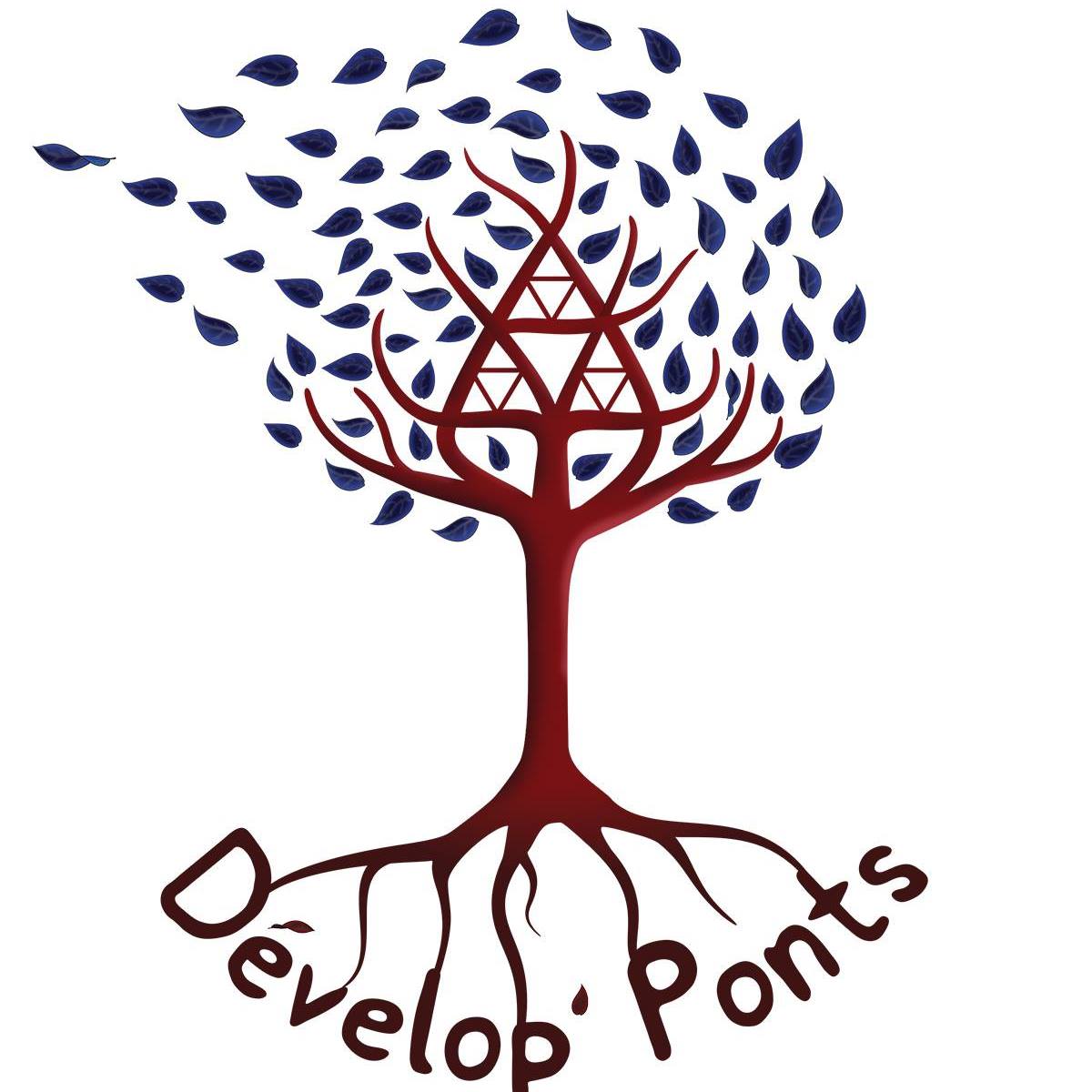
Dévelop'Ponts, a School student association created in 2001, takes action towards sustainable development and helps raise awareness among stakeholders.
With its six main priorities (Solidarity, Environment, Humanitarian action, Equality, Social Action and the Student Refugee Programme), the association is active in many areas and organises a wide range of events such as charity runs, humanitarian projects, coffee discussions, tutoring, and food distribution.
![]()
The Student Forum for a Sustainable Future (Forum Etudiant pour un avenir Durable - FEAD) is the association that organizes the Student Forum for a Sustainable Future. Held at the School, this forum brings together organizations (companies, associations, public authorities, etc.) and students to discuss sustainable development and the social economy. The organizations present are subject to a selection charter drawn up by the team, in line with the values and meaning that the students want to give to their profession.

